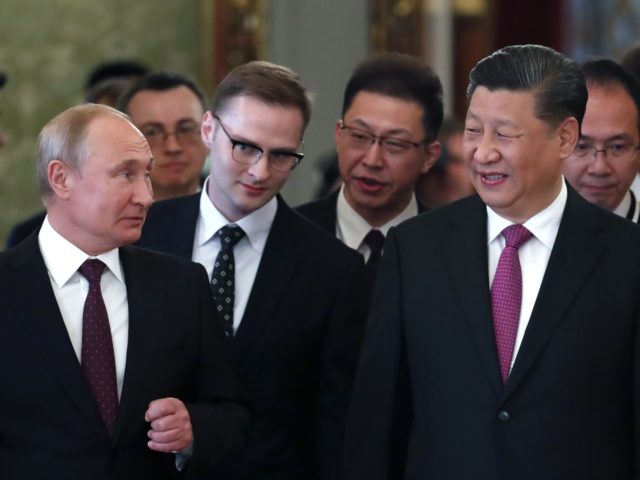Chinese Communist Party leader Xi Jinping arrived in Moscow Wednesday to celebrate 70 years of diplomatic ties between China and Russia and sign an expected 30 agreements with counterpart Vladimir Putin at a perilous time for the Chinese economy.
Xi arrived in Moscow with an entourage that included Foreign Minister Wang Yi and senior diplomat Yang Jiechi. He will attend a meeting with Putin following his arrival and attend the 23rd St. Petersburg International Economic Forum, his first time there, for the rest of his three-day visit. The Forum is intended to attract international investors to participating countries, which both China and Russia currently need.
Confirming the visit last week, Chinese Deputy Foreign Minister Zhang Hanhui told reporters that Putin and Xi expected to sign 30 “agreements,” but did not specify what the agreements were about.
“I think that around 30 agreements will be signed. I cannot yet provide this information as consultations continue,” he said. The Russian news agency TASS suggested that the agreements “will focus on cooperation in economy, trade, energy, investment and other spheres.”
Russian officials said they expected the two sides to sign a “global partnership and strategic cooperation” declaration, without specifying what that declaration would look like. Russia and China cooperate typically not only on economic policy but on geopolitics, supporting each other’s interests at the United Nations and other global venues.
Arriving in Moscow, Xi expressed optimism that his visit would “yield fruitful results serve as an incentive to the steady development of Chinese-Russian relations of comprehensive partnership and strategic interaction in the new era.”
“The new era” is a term Xi regularly uses to refer to an age of Chinese global political supremacy upon the fall of the United States.
Xi had high praise for Putin and said he expected the meeting to be mutually beneficial.
“I have had closer interactions with President Putin than with any other foreign colleagues,” Xi told reporters. “He is my best and bosom friend. I cherish dearly our deep friendship.”
China Daily, a government publication, suggested that the two countries need such a visit in light of their falling economies. Russia’s economy has been languishing for years, never quite recovering from the fall of the Soviet Union. China’s is facing renewed challenges as President Donald Trump’s policies challenge currency manipulation, intellectual property theft, and the use of debt traps to colonize developing countries – the backbones of the Chinese communist economy. Trump has imposed tariffs on Chinese products to discourage American companies from doing business in China and bring their profits back into the United States.
China and Russia, China Daily reported, are seeking “stronger ties amid the changing international landscape.”
“Observers said cooperation between China and Russia, with both being permanent members of the United Nations Security Council, will play a significant role in promoting global peace and stability,” the newspaper argued.
China’s head of state comes to Russia with an economy weakened by an extended trade dispute with the United States. Xi told reporters he thinks the Chinese economy is in a “reasonable” place given the current talks with Washington and asserted that China has “sufficient conditions, ability and confidence” to get through the damage of a trade war with America.
China’s economy is nonetheless suffering from policies meant to curb its rogue behavior on the world stage. The Caixin manufacturing purchasing managers’ index (PMI) revealed this week that China’s business confidence is at its lowest levels since April 2012. The PMI for manufacturing fell, as well. The International Monetary Fund (IMF) also weighed in on Wednesday, lowering its growth forecast because of the trade negotiations with the United States.
“The trade tensions have had an impact, significant, but in our view, so far contained,” Kenneth Kang, deputy director of the Asia-Pacific Department at the IMF, told CNBC. “The renewed trade tensions are a significant source of uncertainty and a downside risk to our outlook.”
Inflation in food prices is also hitting the Chinese middle class significantly, the New York Times reported on Tuesday.
“Whoever eats apples these days must be loaded,” a grocer, Li Tao, told the Times. Among the other foods with higher prices were pork, chicken, beef, and lamb.
The Chinese government has accused the United States of “naked economic terrorism” and “economic bullying” and called President Trump’s economic policies the “most barbarian ever.” Trade talks China hopes to use to change the policies to make them more favorable to Chinese companies and interests have stalled.
Russia’s languishing economy is also struggling. Just as the IMF downgraded China, the World Bank downgraded Russia’s growth for the third time this year on Wednesday. Growth is now expected at a paltry 1.2 percent, according to the Moscow Times. China is the world’s top destination for Russian imports, making it an invaluable partner in expanding growth.

COMMENTS
Please let us know if you're having issues with commenting.